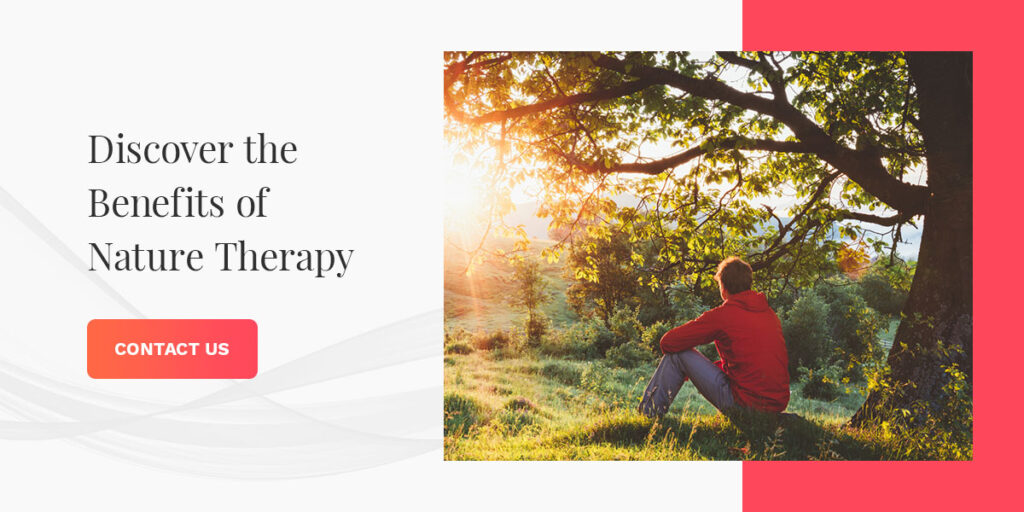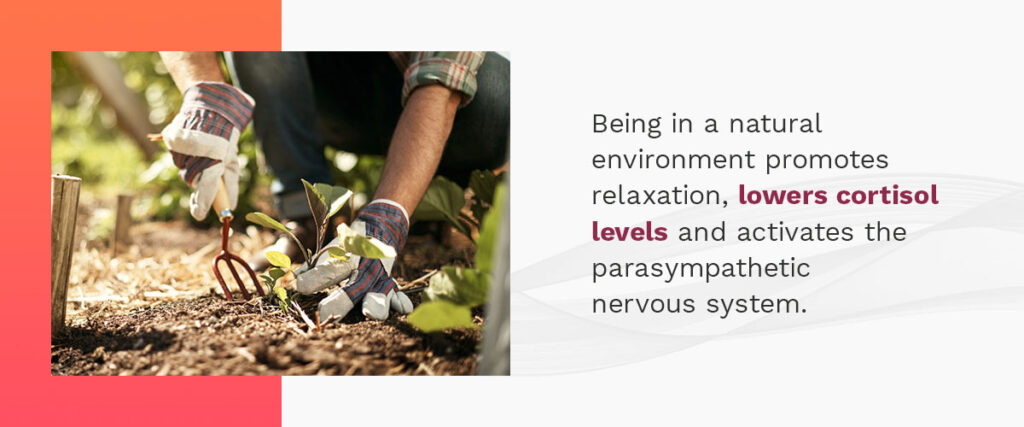Ecotherapy: The Role of Nature in Healing Addiction
Spending time in nature can provide numerous benefits for our mental health, and this is especially true for people with addiction. Nature therapy, also known as ecotherapy or green therapy, stems from the idea that the more connected to the environment or the big picture, the less isolated we are.
Nature can help with stress, anxiety and depression and improve our overall mood. Just a few minutes spent in the sun or taking a walk can be beneficial. Continue reading to learn how time outside can help people with addiction and some activities you can participate in to reap the benefits.
What Is Ecotherapy?
Ecotherapy is an approach to mental health treatment that recognizes the therapeutic benefits of being in nature. It allows people to explore their relationship with nature by engaging in outdoor activities and experiences. These activities are meant to promote healing, personal growth and overall wellness.
Growing research has highlighted several mental and physical health benefits of connecting with nature. As a result, many researchers believe in the power of ecotherapy to help people with addiction heal and improve their overall well-being. Ecotherapy can also help people manage symptoms of depression, anxiety and stress.
It’s crucial to note that ecotherapy is not a standalone treatment for addiction but a complementary approach that works alongside evidence-based therapies and professional guidance. Seeking support from holistic addiction treatment centers that incorporate ecotherapy can help you harness the healing potential of nature in your journey toward recovery. Ecotherapy: The Role of Nature in Healing Addiction.
How Does Time Outside Help Addiction?
Nature can serve as a source of inspiration, resilience and solace during the recovery process. Numerous studies suggest nature’s positive impact on our moods, stress levels and mental health conditions like depression and anxiety.
Reduces Stress
Being in nature has been shown to reduce stress levels, which often underlie addiction and substance use. Being in a natural environment promotes relaxation, lowers cortisol levels and activates the parasympathetic nervous system, leading to a calmer state of mind. This can help people manage stress and anxiety, which are common triggers for addictive behaviors. Ecotherapy: The Role of Nature in Healing Addiction.
Additionally, exposure to nature can stimulate the release of endorphins and other feel-good neurotransmitters in the brain, serving as a healthier coping mechanism for addictive behaviors.
 Inspires Reflection
Inspires Reflection
Spiritually, nature can offer a sense of connection, purpose and meaning to support individuals on their recovery journey. Nature helps people appreciate the beauty and vastness of the natural world, fostering a sense of gratitude and awe — the connection to something greater than the self can provide spiritual nourishment and a sense of purpose. Ultimately, ecotherapy can inspire reflection and help you develop a stronger sense of self and motivation for a healthier lifestyle.
Builds Coping Skills
Nature also offers a distraction from triggers and unhealthy environments associated with addiction. It provides a safe and supportive space where individuals can engage in physical activity, practice mindfulness and find solace. The tranquility and serenity of nature can enhance self-reflection, self-awareness and personal growth, allowing individuals to explore underlying issues and develop healthier coping mechanisms.
Promotes Teamwork and Confidence
Moreover, nature-based activities like hiking, gardening or participating in wilderness therapy programs can promote teamwork, problem-solving skills and a sense of accomplishment. These experiences build confidence and resilience, providing individuals with valuable tools to overcome challenges in their recovery. Ecotherapy: The Role of Nature in Healing Addiction.
Examples of Ecotherapy Activities
Nature and addiction recovery can take many forms. Ecotherapy activities you might find at treatment centers can include:
- Wilderness therapy: These structured group programs involve immersive experiences in natural settings like forests or mountains. Here, individuals can engage in hiking, team-building exercises and therapy sessions. Each experience is meant to encourage personal growth, self-reflection and the development of coping skills.
- Forest bathing: This tradition has become a form of nature therapy that involves fully immersing yourself in nature to experience it with all five senses. Like nature meditation, it involves concentrating on the experience of being in nature rather than simply walking through it while talking or engaging in simultaneous activities.
- Boat therapy: A relaxing day on the water can be a powerful form of therapy, offering you time to release tension, healthily deal with emotions and become more in tune with yourself. Battling the waves and spending your time on the water can also offer a new set of challenges to overcome, promoting better decision-making skills. Boat therapy can include canoeing, kayaking and other water activities.
- Horticulture therapy: Also called garden therapy, this type of ecotherapy involves cultivating and caring for flowers, fruits, vegetables and other greens in a garden area. Horticultural therapy has been shown to lower symptoms of depression and stress.
- Animal-assisted therapy: This therapy involves being around animals in the process of healing and emotional support. It might involve a structured group program caring for animals on a farm or be incorporated into an individual therapy treatment plan.
How Effective Is Ecotherapy?
Ecotherapy has shown promising results in improving mental health and well-being, but its effectiveness can vary depending on individual circumstances and the specific nature of the therapy. While research on ecotherapy is still developing, several scientific studies and anecdotal evidence suggest positive outcomes.
As mentioned, engaging with nature through ecotherapy has been associated with reduced anxiety, depression and stress — which often underlie substance use disorders. Spending time outside can help people with addiction combat cravings and establish healthier coping skills through exercise, gardening, paddling or hiking.
Physical activities, like hiking and gardening, can enhance fitness and cardiovascular health and cause the release of dopamine and serotonin — our body’s natural feel-good chemicals. Research also suggests that exposure to nature can improve cognitive function, including attention, creativity and problem-solving abilities.
Lastly, ecotherapy can foster a sense of connection to nature, promoting a deeper sense of meaning, purpose and spirituality. In this sense, nature can help heal addiction by increasing life satisfaction and a greater sense of well-being.
Contact Transformations By The Gulf and Discover the Benefits of Nature Therapy

Connect with nature and discover the power of holistic healing at our treatment center. Ecotherapy: The Role of Nature in Healing Addiction.
If you or someone you know would like to know more about Transformations by the Gulf Substance Abuse Treatment Center Give us a Call 24/7 (727)498-6498
The success of a person’s recovery depends on the level of personalized treatment provided. It is important to find an addiction treatment program that works. When we say our treatment is individualized, we mean that we craft a program that is tailored to address the client’s unique physical, mental and emotional needs.
In the client’s first 24 hours with us, we’ll evaluate their current state and work to understand what challenges they need to overcome. They’ll also have an initial session with our doctor and meet with one of our licensed mental health professionals.
After the initial evaluations, we’ll design a treatment plan with the sole mission of helping the client overcome and heal from addiction. Their program will focus on things such as:
- Addressing and Identifying root causes of addiction.
- Creating a support system.
- Developing healthy stress management techniques.
- Eliminating Substance use.
- Learning how to communicate emotions effectively.
- Maintaining a healthier lifestyle.
- Repairing damaged relationships.
Are you struggling with addiction and want to learn more? Visit Psychology Today or check out or page on addiction treatments.
Our Facility is near the beach and offers a comfortable setting for substance abuse treatment and recovery.
What a Day is Like in Our Treatment Facility.
Why Transformations by the Gulf?
 Inspires Reflection
Inspires Reflection